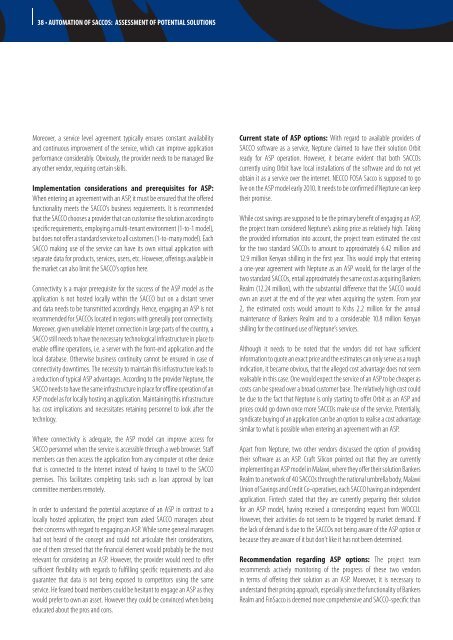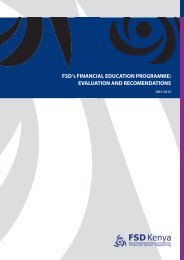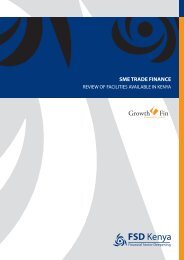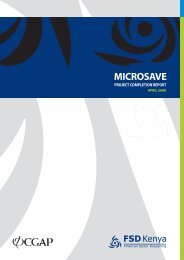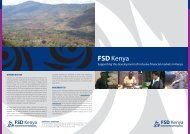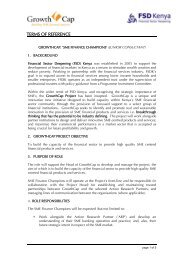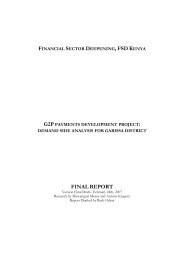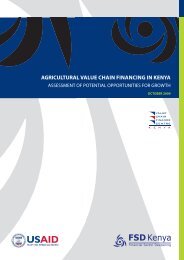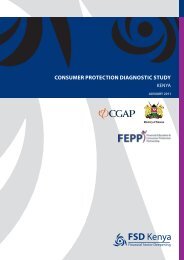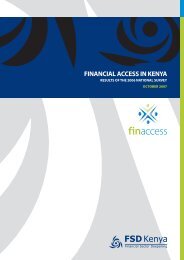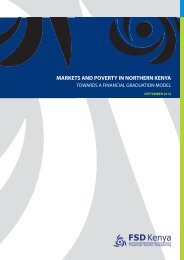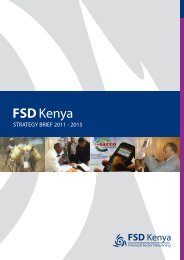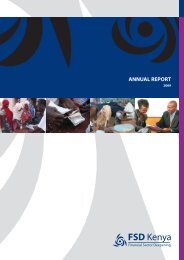Automation of SACCOs - FSD Kenya
Automation of SACCOs - FSD Kenya
Automation of SACCOs - FSD Kenya
Create successful ePaper yourself
Turn your PDF publications into a flip-book with our unique Google optimized e-Paper software.
38 • AUTOMATION OF SACCOS: ASSESSMENT OF POTENTIAL SOLUTIONS<br />
Moreover, a service level agreement typically ensures constant availability<br />
and continuous improvement <strong>of</strong> the service, which can improve application<br />
performance considerably. Obviously, the provider needs to be managed like<br />
any other vendor, requiring certain skills.<br />
Implementation considerations and prerequisites for ASP:<br />
When entering an agreement with an ASP, it must be ensured that the <strong>of</strong>fered<br />
functionality meets the SACCO’s business requirements. It is recommended<br />
that the SACCO chooses a provider that can customise the solution according to<br />
specific requirements, employing a multi-tenant environment (1-to-1 model),<br />
but does not <strong>of</strong>fer a standard service to all customers (1-to-many model). Each<br />
SACCO making use <strong>of</strong> the service can have its own virtual application with<br />
separate data for products, services, users, etc. However, <strong>of</strong>ferings available in<br />
the market can also limit the SACCO’s option here.<br />
Connectivity is a major prerequisite for the success <strong>of</strong> the ASP model as the<br />
application is not hosted locally within the SACCO but on a distant server<br />
and data needs to be transmitted accordingly. Hence, engaging an ASP is not<br />
recommended for <strong>SACCOs</strong> located in regions with generally poor connectivity.<br />
Moreover, given unreliable Internet connection in large parts <strong>of</strong> the country, a<br />
SACCO still needs to have the necessary technological infrastructure in place to<br />
enable <strong>of</strong>fline operations, i.e. a server with the front-end application and the<br />
local database. Otherwise business continuity cannot be ensured in case <strong>of</strong><br />
connectivity downtimes. The necessity to maintain this infrastructure leads to<br />
a reduction <strong>of</strong> typical ASP advantages. According to the provider Neptune, the<br />
SACCO needs to have the same infrastructure in place for <strong>of</strong>fline operation <strong>of</strong> an<br />
ASP model as for locally hosting an application. Maintaining this infrastructure<br />
has cost implications and necessitates retaining personnel to look after the<br />
technlogy.<br />
Where connectivity is adequate, the ASP model can improve access for<br />
SACCO personnel when the service is accessible through a web browser. Staff<br />
members can then access the application from any computer ot other device<br />
that is connected to the Internet instead <strong>of</strong> having to travel to the SACCO<br />
premises. This facilitates completing tasks such as loan approval by loan<br />
committee members remotely.<br />
In order to understand the potential acceptance <strong>of</strong> an ASP in contrast to a<br />
locally hosted application, the project team asked SACCO managers about<br />
their concerns with regard to engaging an ASP. While some general managers<br />
had not heard <strong>of</strong> the concept and could not articulate their considerations,<br />
one <strong>of</strong> them stressed that the financial element would probably be the most<br />
relevant for considering an ASP. However, the provider would need to <strong>of</strong>fer<br />
sufficient flexibility with regards to fulfilling specific requirements and also<br />
guarantee that data is not being exposed to competitors using the same<br />
service. He feared board members could be hesitant to engage an ASP as they<br />
would prefer to own an asset. However they could be convinced when being<br />
educated about the pros and cons.<br />
Current state <strong>of</strong> ASP options: With regard to available providers <strong>of</strong><br />
SACCO s<strong>of</strong>tware as a service, Neptune claimed to have their solution Orbit<br />
ready for ASP operation. However, it became evident that both <strong>SACCOs</strong><br />
currently using Orbit have local installations <strong>of</strong> the s<strong>of</strong>tware and do not yet<br />
obtain it as a service over the internet. NECCO FOSA Sacco is supposed to go<br />
live on the ASP model early 2010. It needs to be confirmed if Neptune can keep<br />
their promise.<br />
While cost savings are supposed to be the primary benefit <strong>of</strong> engaging an ASP,<br />
the project team considered Neptune’s asking price as relatively high. Taking<br />
the provided information into account, the project team estimated the cost<br />
for the two standard <strong>SACCOs</strong> to amount to approximately 6.42 million and<br />
12.9 million <strong>Kenya</strong>n shilling in the first year. This would imply that entering<br />
a one-year agreement with Neptune as an ASP would, for the larger <strong>of</strong> the<br />
two standard <strong>SACCOs</strong>, entail approximately the same cost as acquiring Bankers<br />
Realm (12.24 million), with the substantial difference that the SACCO would<br />
own an asset at the end <strong>of</strong> the year when acquiring the system. From year<br />
2, the estimated costs would amount to Kshs 2.2 million for the annual<br />
maintenance <strong>of</strong> Bankers Realm and to a considerable 10.8 million <strong>Kenya</strong>n<br />
shilling for the continued use <strong>of</strong> Neptune’s services.<br />
Although it needs to be noted that the vendors did not have sufficient<br />
information to quote an exact price and the estimates can only serve as a rough<br />
indication, it became obvious, that the alleged cost advantage does not seem<br />
realisable in this case. One would expect the service <strong>of</strong> an ASP to be cheaper as<br />
costs can be spread over a broad customer base. The relatively high cost could<br />
be due to the fact that Neptune is only starting to <strong>of</strong>fer Orbit as an ASP and<br />
prices could go down once more <strong>SACCOs</strong> make use <strong>of</strong> the service. Potentially,<br />
syndicate buying <strong>of</strong> an application can be an option to realise a cost advantage<br />
similar to what is possible when entering an agreement with an ASP.<br />
Apart from Neptune, two other vendors discussed the option <strong>of</strong> providing<br />
their s<strong>of</strong>tware as an ASP. Craft Silicon pointed out that they are currently<br />
implementing an ASP model in Malawi, where they <strong>of</strong>fer their solution Bankers<br />
Realm to a network <strong>of</strong> 40 <strong>SACCOs</strong> through the national umbrella body, Malawi<br />
Union <strong>of</strong> Savings and Credit Co-operatives, each SACCO having an independent<br />
application. Fintech stated that they are currently preparing their solution<br />
for an ASP model, having received a corresponding request from WOCCU.<br />
However, their activities do not seem to be triggered by market demand. If<br />
the lack <strong>of</strong> demand is due to the <strong>SACCOs</strong> not being aware <strong>of</strong> the ASP option or<br />
because they are aware <strong>of</strong> it but don’t like it has not been determined.<br />
recommendation regarding ASP options: The project team<br />
recommends actively monitoring <strong>of</strong> the progress <strong>of</strong> these two vendors<br />
in terms <strong>of</strong> <strong>of</strong>fering their solution as an ASP. Moreover, it is necessary to<br />
understand their pricing approach, especially since the functionality <strong>of</strong> Bankers<br />
Realm and FinSacco is deemed more comprehensive and SACCO-specific than


